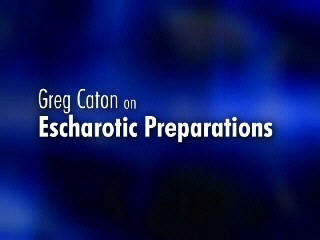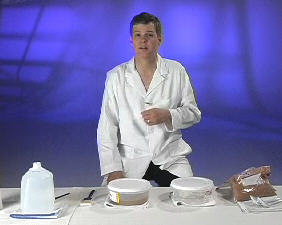 <
<
 >
>


 Today, videos are
an important multimedia communications tool in conveying
substance, non-verbal content, and credibility on the
internet. We had
a
video page at Alpha Omega Labs to show real life cases
involving cancer cures related to the use of
Cansema -- though this was nothing
compared to our written testimonial pages -- which took hours to read.
 The first two
videos below (which should be seen sequentially)
reveals the basics of making an escharotic preparation --
like the ones that thousands of physicians and private citizens have
been making secretly since at least 1858 (and probably back
much further). The second in this series
has some additional pointers which were
left out of the first video on zinc chloride.
About half of the content was read
from a teleprompter and other half spoken extemporaneously.
I threw the entire project together in 24 hours -- start to finish.
So there's plenty to criticize -- believe me.
 Before
you view either of these videos, you are
advised to at least read Chapters 1
and 2 of the online
Meditopia book. To pick a video and see it on your
Windows desktop, just click on the text under "Title" below.
Be patient and wait the Windows Media Player to come up
and begin the video. All files are in the streaming
"wmv" format.

 Some additional pointers:
the most economical way to purchase zinc chloride is in the
50 kg. canister. Mallinkroft is a leading manufacturer,
but, again, you will need to get it through an
industrial chemical distributor. This was discussed
in the video as it was made, but somehow got left out
in the editing process. In addition, it would
be valuable, if you are going to learn the "a priori art," to
examine the U.S. patents mentioned in the book, specifically
U.S. Patents 203,331; 1,411,577; 4,229,437; and 4,315,916.
You can view patents online at The United States Patent & Trademark Office,
or one of the premium patent sites
(i.e. for an introduction, see www.delphion.com/about-company).
 The comments contained
on these videos represent the personal thoughts of
myself (Greg Caton) and not any of the companies
with which I am associated. If you have any
questions, just email us.
Medical Sciences, Inc. Promotional Video (1989)

Medical Sciences
Promotional Video |
Description |
Size |
| Segment 1 |
The entire tape was given to the author in 1989, as
recounted in Chapter 1 of Meditopia.
It was not until October, 2006 (17 years later) that the VCR tape
was digitally converted -- so the video quality is quite poor
throughout. But not the sound.
The visuals in the opening seconds are particularly bad with a lot
of "black screening." This entirety of this segment focuses
on an interview with
Dr. John Wood, a respected
Texas veterinarian, who herein reports on the phenomenal results in the
use of Medical Sciences, Inc. lead product, Sci-Plus --
which was developed further by the author and eventually sold
as Cansema Tonic I.
He discusses a smorgasbord of immune-related diseases in
animals that Sci-Plus cured -- some quite difficult
to treat, such as
fistula
of the withers in horses . . .
|
36,300 k
T = 10:00 |
| Segment 2 |
The first 1:07 of this segment covers the last of
the interview with Dr. John Wood, where he closes by
saying that although he found it hard to accept the "hype"
that came with his introduction to Sci-Plus, he ended up being
"excited by some of the things it will do." (Committed to
the system, he, too, shows reluctance in crossing
the "common narrative.") Hector Garcia, a farrier, comes
next to discuss his experience with Sci-Plus on horses.
He discusses the dramatic cancer cure of his wife's
five-year old Arabian. He expressed surprise over the
huge decavitations that resulted with no sign of secondary
infection. At 4:54 the segment switches back to
Dr. John Wood who theorizes on the product's effect
on immunology -- on animals AND humans. At 6:50
Dr. Woods is prodded to speculate on the politically dangerous:
if it works this well for animal diseases for which modern
veterinary medicine offers nothing comparable, what
about its possible effects on humans? He demurs on
professional grounds initially, but then states:
"My personal opinion is: yes, most definitely."
(7:03 - 7:07). At this point the video shifts its
attention on skin cancer: "the product works
on every skin cancer on which it has been applied."
This success rate was to be mimicked in the use of
Cansema by Alpha Omega Labs from the early '90's
to 2003. At 7:28, a Mr. Jim Byrd gives his own
remarkable testimony -- commenting on the edematous
effects and, again, the ejection of the cancer without
any trace of secondary invection (testing with hydrogen
peroxide). Mrs. Byrd (8:32) testifies, and then
Mr. Byrd reveals one of the reasons he wouldn't go back
to the conventional doctor: they cut out his lip.
Now he knows this surgery was unnecessary.
|
37,321 k
T = 10:00 |
| Segment 3 |
Finishing a closing comment by Mr. Jim Byrd, the video shifts to
other skin disorders, starting with psoriasis (case: Patsy Larson with
parpsoriasis).
It cured it. Her husband at 3:52 recounts his own case
of recurring acne that the product worked on.
At 4:45, effects of internal use on the boosting of
the immune system is discussed. At 4:54, Marie Blanton
discusses its effect on her breast cancer, who
successfully used the product in November, 1986.
She ends by discussing the internal product's positive
effects on her arthritis, wherein the product fades into
the case of Paul Wilson, lead investigator (then) for
the Texas Railroad Commission. He discusses the
arthritis version's miraculous effects on his arthritis.
(Later, its name is revealed "Sci-thritis.).
He took product once a day for three and a half months
(8:05), and didn't need to continue use. Arthritis
cured. At 8:30, the video shifts to 68-year old
Raymond Prinz and the positive effects on his arthritis.
("Cured it!") This segment closes with the beginning
of an interview with Mr. George Schwartzer and its
effects on his prostate cancer ... (continuing on next segment) ...
|
37,579 k
T = 10:04 |
| Segment 4 |
George Swartzer's interview continues, fading to his wife,
Anne Swartzer, discussing how George was told that his prostate
cancer was (using layman's terms) a "ten on a scale of one to
ten." With advanced Stage IV prostate cancer, George
was told something we heard for the entire duration I ran
Alpha Omega Labs, "There's no hope." The resulting recommendation?
Unnecessary and expensive radical surgery, of course.
At 3:30, the case of a breast cancer patient,
27 year old Penny Minor, is discussed, beginning with her
interview / testimony. Doctors ignorant in the ways of
escharotic preparations recommend radical surgery (of course ...
in this case, bilateral, subcutaneous masectomy).
They screw it up (of course). She dies on the operating
table (of course) ... luckily, in this case, not permanently:
by their own lame admission, they acknowledge that she had
been dead for "three minutes and twenty-seven seconds".
The doctors "thought I was going to be retarded . . . because
I had been 'out' for so long" (of course). After which they
took four hours to bring her back (of course ... great job
of pumping up the surgical bill). And then, to help keep
the money coming in, they recommend that after two weeks of
rest that she come back to finish the surgery they didn't
complete to begin with (or course). When Penny asks what
would happen if she didn't come back in for this radical,
invasive surgery, they reply that "you'll be dead before
you're twenty-eight" (of course ... gotta close the sale).
When Penny says "what are the chances of coming off the
operating table this time without complications," the doctors
hedge their bets (of course), replying that her chances
are "fifty-fifty." She tells them to forget it -- what
with two small toddlers and a family life to consider.
When Penny goes back in the following January to inquire
about another mysterious lump, she is told after another
brush with the operating table that she has scar tissue from the
previous surgery, which is why her scheduled 30 minutes surgery
took three hours (of course). She took the alternative
Sci-Plus formula, so the doctor doesn't find any cancer
(of course), and the interview closes with an emotional
note of gratitute from Penny. At 6:35 the narrator
emphasizes that Medical Sciences, Inc. is "a medical
technology company developing products for the treatment
of arthritis, psoriasis, cancer and AIDS." The video
closes at 6:48, at which point the video breaks off
and shows the beginning of Ken Ausubel's movie,
Hoxsey: How Healing Becomes a Crime (1987),
still viewable in its entirety on the AO web site,
with commentary
on
the Video Gallery page of that site.
|
37,327 k
T = 10:00 |
|





